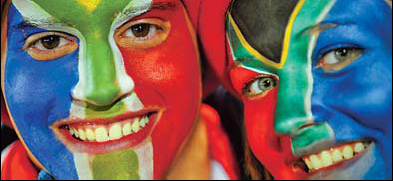北京時(shí)間7月12日凌晨,在經(jīng)過31個(gè)日夜的鏖戰(zhàn)之后,2010年南非世界杯落下帷幕。首次舉辦世界杯大賽的東道主南非在此期間向全世界的球迷和觀眾展現(xiàn)了一個(gè)嶄新的非洲大陸,各國(guó)媒體均評(píng)價(jià)此次世界杯為“非洲大陸的勝利”、“一次盛大的聚會(huì)”以及“組織良好的一屆杯賽”。在南非國(guó)內(nèi),舉辦此次世界杯的意義堪與20年前曼德拉走出種族隔離監(jiān)獄、讓南非走上完全民主之路相比。南非總統(tǒng)祖馬表示,世界杯期間,南非人民爆發(fā)出來的民族自豪感和團(tuán)結(jié)精神是這次大賽帶給南非最有價(jià)值的收獲,全世界看到了一個(gè)嶄新的非洲,這是花多少錢也買不到的效果。

 |
|
South Africa supporters cheer for their team during the Cup. |
The World Cup unveiled a new South Africa to the rest of the planet, upending stereotypes and nightmare scenarios about a country that proudly showed off its modern accomplishments.
Images of the world's best footballers, ecstatic fans and top stadiums ruled headlines usually clouded by South Africa's painful apartheid divisions and staggering crime and poverty that still afflict millions.
"The world has seen this country in a different light," President Jacob Zuma boasted.
The first World Cup on African soil has also rubbed off on the rest of the continent, often written off in shades of despair, as 17 states mark 50 years of independence from European colonial powers.
Newspapers from around the world have declared the World Cup a "win for all of Africa", "a big successful party", and a "well-organized Cup" as visiting celebrities gushed about the host.
Within South Africa, the experience was compared to the euphoria experienced 20 years ago when Nelson Mandela walked out of an apartheid prison and set the nation on the path toward full democracy, with elections he won in 1994.
"To just present a new South Africa that we dreamt about when Mandela walked out of prison in 1990 becoming a reality in 2010, and that was special," said the top World Cup organizer Danny Jordaan, a veteran of the democracy struggle.
After the kickoff on June 11, dire warnings overseas that tourists would need stab-proof vests and private bodyguards quickly slipped away in favor of images of a multi-racial nation celebrating together in modern cities.
"The explosion of national pride and the unity that has been displayed by all South Africans is an invaluable benefit of the tournament," Zuma said.
In a country where the median age is 25, most South Africans alive today had little first-hand experience of apartheid which forced races apart but sharp divisions still exist.
Crime is justifiably a national pre-occupation, with an average 50 murders a day but most violent crime takes place among the poorest South Africans in shantytowns far from the typical tourist vista.
South Africa's poor also experience the greatest struggles getting an education, accessing public services and finding a job - which give the country the world's biggest gap between rich and poor.
For the middle and upper classes, the World Cup created an incentive to mingle across racial lines - to take trains and buses together, to sing and blow vuvuzelas in the stands.
After the World Cup, most people will return to their normal lives, and few expect to see many white faces in black neighborhoods. "After, it will be quiet and there won't be any whites any more in Soweto," said Evans Shivambu, at a farewell parade for the tournament.
But sports authorities say they want to make an effort and next month will stage a rugby Test match in Soccer City, bringing a traditionally white sport to the stadium on the edge of Soweto.
Despite stadium white elephant worries - the perennial headache of major sports events - the finance ministry says a 38 billion rand ($5 billion) investment in the event paid off without overburdening a budget already financing a $110 billion construction spree.
And the real gains, South Africa believes, are in changing the world's perceptions, a benefit that is hard to quantify.
"You could never pay for it, so I think it's invaluable," said Gillian Saunders, director of Grant Thornton advisory services.
"The real payoff is not the event itself, it's the global profiling of South Africa and that's gone very, very well," she said.
相關(guān)閱讀
阿內(nèi)爾卡被炒 法國(guó)隊(duì)集體罷訓(xùn)
(Agencies)

(中國(guó)日?qǐng)?bào)網(wǎng)英語點(diǎn)津 Helen 編輯)
